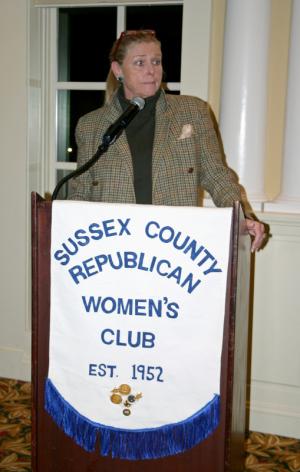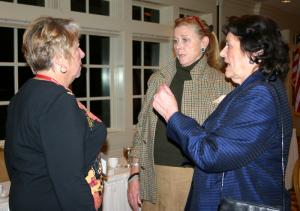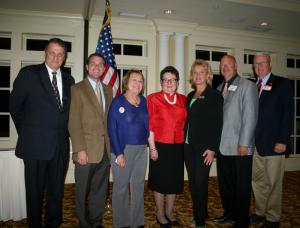Former journalist says human trafficking an epidemic
The Sussex County Republican Women's Club received a harsh reality check when veteran journalist Christine Dolan described a human trafficking case that struck close to home.
“Listen up … you don't have a clue,” Dolan said as she began to discuss her more than decade-long experiences with human trafficking. “Just like the Industrial Revolution, just like the Victorian era, just like the African slave trade, you are living in the digital age of slavery in the 21st century. It is not just on the street. It is over the internet.”
Dolan, who worked for ABC and CNN in the 1980s, was commissioned by the International Centre for Missing and Exploited Children to study child exploitation in 2000. Dolan said when she began her study, she was clueless.
“I didn't know about any of this 14 years ago,” she said. “This is an investigation that changed my life.”
Dolan said Easton, Md., shows human trafficking occurs close to home. While many attendees raised their hands to say they were familiar with the town, most audience members voiced surprise that a brothel, operated a few doors down from a Mexican restaurant on Dover Street, was busted just a few years ago, leading to sex trafficking convictions in fall 2013.
“If you think it can't happen in a Norman Rockwell neighborhood, wake up,” Dolan said.
Sussex County Republican Women's Club Vice President Cathy Walls said Dolan's presentation was an awakening for some members.
“They were very surprised at the depth and breadth of terrorism and human trafficking and how it all ties together,” Walls said. “I think that people realize that this is an issue that is in our own backyard. We need to be much more aware of everything.”
Now Dolan is on a mission to spread the word that human trafficking crimes are proliferating throughout the world, which she outlined in her “Tots to Trafficking to Terrorism” presentation during the club's dinner meeting Oct. 22. She said globalization and increased internet access provide ways for everything from child pornography to trafficking for torture to make a mark on international markets.
“Terrorism is a transnational, transcriminal network. Trafficking is transcriminal, transnational network,” she said. Dolan said groups like al-Qaida and the group known as the Islamic State are trafficking organizations with a hand in sex and labor trafficking as well as torture rituals.
Dolan outlined the main branches of human trafficking to include sex and labor, sex tourism, child pornography, child soldiers, organ trafficking, skin trafficking and ritual abuse torture. Dolan cited an evidence comparison by Interpol that 89 percent of online incidents affect victims between the age of 6 and 12, while 10 percent include victims age 3 and younger. She said there have been great efforts made since 2000, but the demand for younger victims has increased, with a jump from 3 percent in 2005 to the recently reported 10 percent of young trafficking victims.
“White males, that's the profile,” she said. Dolan said young teens, who are experiencing their own sexual curiosities, can get caught up in child porn crimes and be targeted for human trafficking.
“We live in a strange age,” she said. “There is a host of people that are part of the human trafficking arena worldwide since the last 14 years.”
While the human trafficking epidemic affects millions of people – men, women and children alike – Dolan said local measures can be taken to assist state and federal mandates, as well as international efforts like Interpol's Virtual Global Task Force.
“You need to set up a task force that works,” she said. “You need to have business leaders in it, you need to have law enforcement involved, you need to have people across the community.”
She pointed to Child Advocacy Centers as a wonderful resource for helping victims heal, but said additional efforts must focus on stopping the crimes.
“The problems can be solved on the local level, but you have to have an awareness, you have to know your community,” she said.
























































